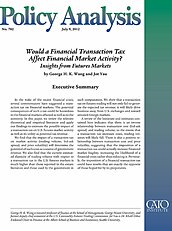We find that the impact of a transaction tax on market activity (trading volume, bid-ask spread, and price volatility) will determine the potential of such a tax as a source of government revenue. We also find that the current estimated elasticity of trading volume with respect to a transaction tax in the U.S. futures markets is much higher than those reported in the extant literature and those used by the government in such computation. We show that a transaction tax on futures trading will not only fail to generate the expected tax revenue, it will likely drive business away from U.S. exchanges and toward untaxed foreign markets.
A review of the literature and estimates contained here indicates that there is an inverse relationship between transaction cost (bid-ask spread) and trading volume; to the extent that a transaction tax increases costs, trading volumes will likely fall. There is also a positive relationship between transaction cost and price volatility, suggesting that the imposition of a transaction tax could actually increase financial market fragility, increasing the likelihood of a financial crisis rather than reducing it. Perversely, the imposition of a financial transaction tax could have results that are exactly the opposite of those hoped for by its proponents.

